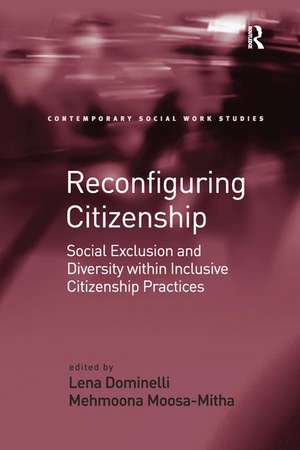Reconfiguring Citizenship: Social Exclusion and Diversity within Inclusive Citizenship Practices
Autor Mehmoona Moosa-Mitha Editat de Lena Dominellien Limba Engleză Paperback – 9 sep 2016
| Toate formatele și edițiile | Preț | Express |
|---|---|---|
| Paperback (1) | 474.27 lei 6-8 săpt. | |
| Taylor & Francis – 9 sep 2016 | 474.27 lei 6-8 săpt. | |
| Hardback (1) | 1046.22 lei 6-8 săpt. | |
| Taylor & Francis – 11 iun 2014 | 1046.22 lei 6-8 săpt. |
Preț: 474.27 lei
Nou
Puncte Express: 711
Preț estimativ în valută:
90.81€ • 94.56$ • 75.34£
90.81€ • 94.56$ • 75.34£
Carte tipărită la comandă
Livrare economică 14-28 februarie
Preluare comenzi: 021 569.72.76
Specificații
ISBN-13: 9781138249042
ISBN-10: 1138249041
Pagini: 322
Dimensiuni: 156 x 234 x 17 mm
Greutate: 0.45 kg
Ediția:1
Editura: Taylor & Francis
Colecția Routledge
Locul publicării:Oxford, United Kingdom
ISBN-10: 1138249041
Pagini: 322
Dimensiuni: 156 x 234 x 17 mm
Greutate: 0.45 kg
Ediția:1
Editura: Taylor & Francis
Colecția Routledge
Locul publicării:Oxford, United Kingdom
Notă biografică
Lena Dominelli is Professor in Applied Social Sciences at Durham University, UK. She was President of the International Association of Schools of Social Work (IASSW) from 1996-2004. Mehmoona Moosa-Mitha is Associate Professor at the School of Social Work, University of Victoria, Canada.
Recenzii
’This book fills a significant gap in the literature on social work practice and will be greatly appreciated by social workers who work with immigrant and indigenous groups, asylum seekers, migrant workers, and exchange students as well as other marginalized people whose rights of citizenship are denied for political reasons. In the space of 24 succinct and informative chapters, Reconfiguring Citizenship expands our understanding of citizenship considerably and challenges our taken-for-granted assumptions concerning the rights of native-born and naturalized versus foreign residents of a country.’ Katherine van Wormer, University of Northern Iowa, USA
Cuprins
Introduction, LenaDominelli, MehmoonaMoosa-Mitha; Part 1 (Re)Conceptualising Citizenship; Chapter 1 Problematising Concepts of Citizenship and Citizenship Practices, LenaDominelli; Chapter 2 Exclusionary and Inclusionary Citizenship Practices Around Faith-Based Communities, MehmoonaMoosa-Mitha; Chapter 3 Spirituality, Faith Affiliations and Indigenous People’s Experiences of Citizenship, JacquieGreen (Kundoqk); Part 2 Citizenship Practices in Diverse Settings; Chapter 4 Africville, WandaThomas Bernard, MaryPam Vincer; Chapter 5 Migration, Political Engagement and the State, TomVickers; Chapter 6 Called to Serve, MoreblessingTandeka Tinarwo; Chapter 7 Challenges to Human Rights and Social Justice in Denmark, MortenEjrnœs, HelleStrauss; Part 3 Marginalised Identities; Chapter 8 Homelessness and Social Inclusion, AnnDorthe Lund; Chapter 9 My New Filipino is an Ethiopian, AbyeTassé; Chapter 10 Citizens or Denizens, LindaBriskman; Chapter 11 Indigenous Children and State Care, JeannineCarrière (Sohki Aski Esquao), RobinaThomas (Qwul’sih’yah’maht); Chapter 12 Citizenship of Indigenous Greenlanders in a European Nation State, MarieKathrinePoppel; Chapter 13 Culture and Identity, OleMeldgård; Chapter 14 Citizenship, Nation-State and Social Work, WalterLorenz; Chapter 15 Gender, Inclusion and Citizenship, MarionBrown; Chapter 16 What’s Love Got to Do with It? An Analysis of ‘Rights Talk’ and the Social Citizenship of Welfare Recipients, ShalenMarie House; Chapter 17 Developing Inclusionary Services for Disabled People in Zimbabwe, EdsonMunsaka; Chapter 18 Citizenship and the ‘Looked-after Child’, BernieWalsh; Part 4 Lessons from Citizenship Discourses; Chapter 19 Personal Reflections on Supporting Exchange Students, TracieMetcalfe; Chapter 20 Students’ Experiences of Citizenship through International Social Work Exchanges, SarahPflanz, MauroAmatosi, BenjaminHirtle, DurutaSørensen; Chapter 21 Indigenous Approaches to Citizenship, LeslieBrown, JacquieGreen (Kundoqk); Chapter 22 Identity, Inclusion and Citizenship, Judy E. MacDonald, WandaThomas Bernard; Chapter 23 Emancipatory Education, VishanthieSewpaul; Part 5 Inclusionary Citizenship Practices; Chapter 24 Critical Theories, LenaDominelli; Chapter 101 Conclusions, LenaDominelli;
Descriere
Citizenship as a status assumes that all those encompassed by the term 'citizen' are included, albeit within the boundaries of the nation-state. Yet citizenship practices can be both inclusionary and exclusionary, with far-reaching ramifications for both nationals and non-nationals. This volume explores the concept of citizenship and its practices within particular contexts and nation-states to identify whether its claims to inclusivity are justified. This will show whether the exclusionary dimensions experienced by some citizens and non-citizens are linked to deficiencies in the concept, country-specific policies or how it is practiced in different contexts.
